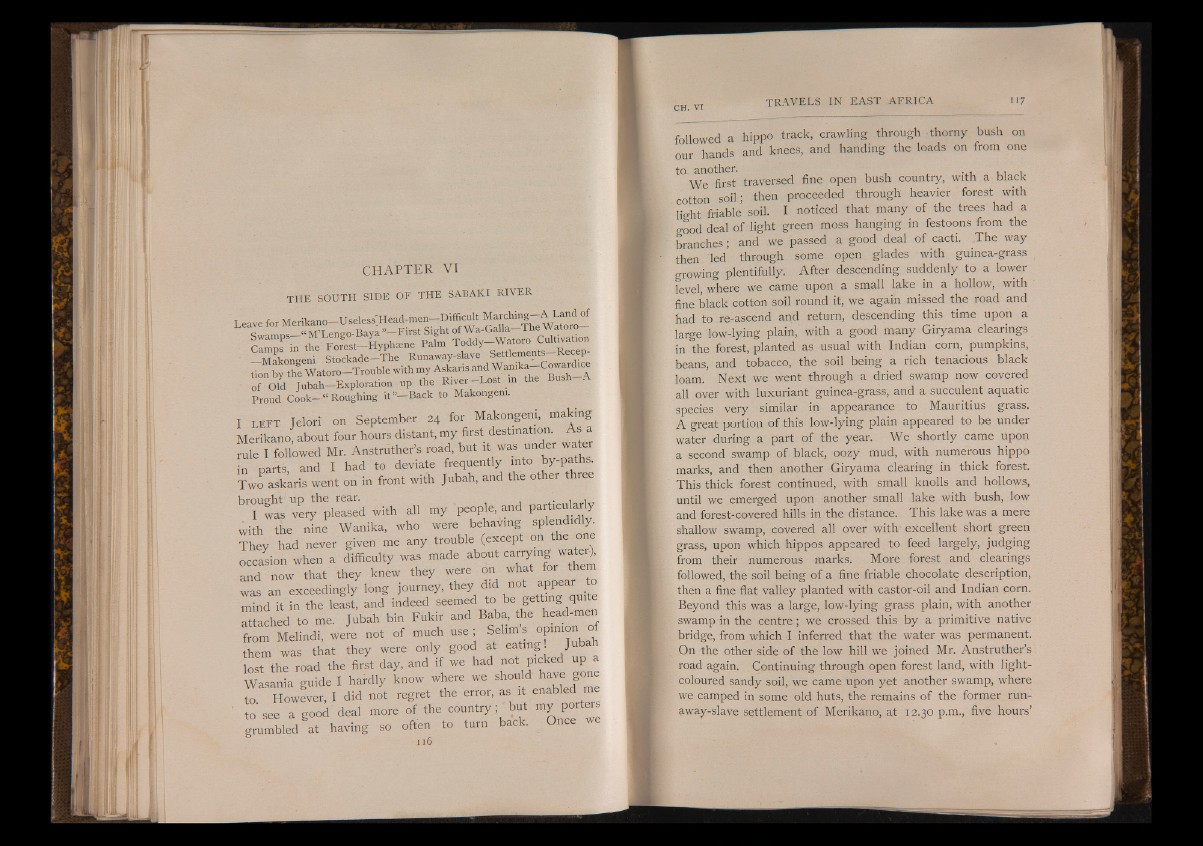
CH A P T ER VI
THE SOUTH SIDE OF THE SABAKI RIVER
ill tion by the Watoro-Trouble with my Askaris and Wamka-Cowardice
or 0 1 d Jubah— Exploration „p the R iv e r-L o s t m the B u sh -A
Proud C o o k - “ Roughing it » -B a c k to Makongem.
I l e f t Jelori on September 24 for Makongeni, making
Merikano, about four hours distant, my first destination. As a
rule I followed Mr. Anstruther’s road, but it was under wat
in parts and I had to deviate frequently into by-paths.
Two askaris went on in front with Jubah, and the other three
h S l V » » my people, and particularly
with the nine Wanika, who were behaving splendid y.
They had never given me any trouble (except on the one
occasion when a difficulty was made about
and now that they knew they were on what for them
was an exceedingly long journey, they di no
mind it in the least, and indeed seemed to be getting quite
attached to me. Jubah bin Fukir and Baba, the head-men
Som Melindi, were not of much use; Sehms H E
them was that they were only good at eating . Ju
lost the road the first day, and if we had not picked up a
Wasania guide I hardly know where we should- have g.one
to However, I did not regret the error, as it enabled me
to see a good deal more of the country; but my port«
grumbled at having so often to turn back. Once we
followed a hippo track, crawling through thorny bush on
our hands and knees, and handing the loads on from one
to_ another. .i. 11 1
We first traversed fine open bush country, with a black
cotton soil; then proceeded through heavier forest with
light friable soil. I noticed that many of the trees had a
good deal of light green moss hanging in festoons from the
branches; and we passed a good deal of cacti. The way
then led through some open glades with guinea-grass
growing plentifully. After descending suddenly to a lower
level, where we came upon a small lake in a hollow, with
fine black cotton soil round it, we again missed the road and
had to re-ascend and return, descending this time upon a
large low-lying plain, with a good many Giryama clearings
in the forest, planted as usual with Indian corn, pumpkins,
beans, and tobacco, the soil being a rich tenacious black
loam. Next we went through a dried swamp now covered
all over with luxuriant guinea-grass, and a succulent aquatic
species very similar in appearance to Mauritius grass.
A great portion of this low-lying plain appeared to be under
water during a part of the year. We shortly came upon
a second swamp of black, oozy mud, with numerous hippo
marks, and then another Giryama clearing in thick forest.
This thick forest continued, with small knolls and hollows,
until we emerged upon another small lake with bush, low
and forest-covered hills in the distance. This lake was a mere
shallow swamp, covered all over with excellent short green
grass, upon which hippos appeared to feed largely, judging
from their numerous marks. More forest and clearings
followed, the soil being of a fine friable chocolate description,
then a fine flat valley planted with castor-oil and Indian corn.
Beyond this was a large, low-lying grass plain, with another
swamp in the centre; we crossed this by a primitive native
bridge, from which I inferred that the water was permanent.
On the other side of the low hill we joined Mr. Anstruther’s
road again. Continuing through open forest land, with light-
coloured sandy soil, we came upon yet another swamp, where
we camped in some old huts, the remains of the former runaway
slave settlement of Merikano, at 12.30 p.m., five hours’